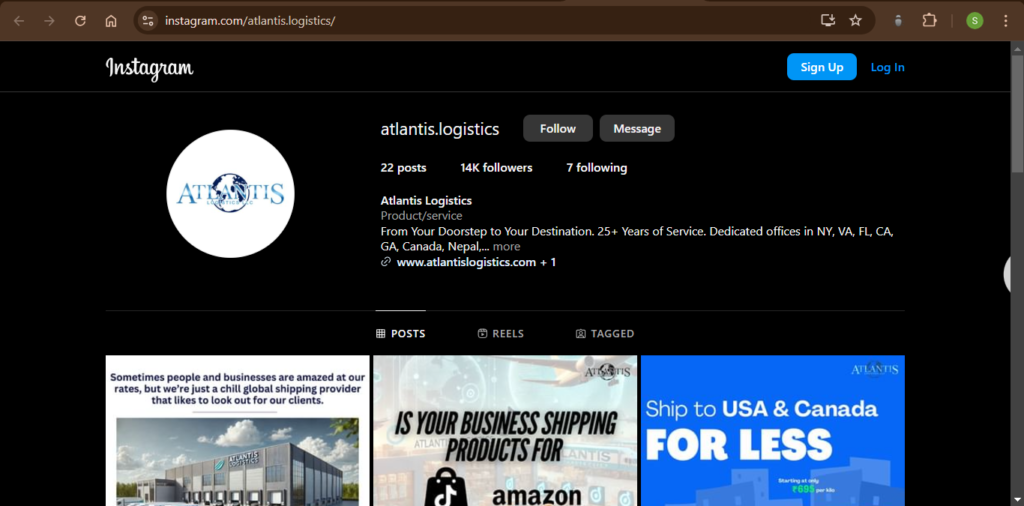In today’s world, everything is just a click away. From shopping to information, everything is online. So, if your logistics business isn’t on the digital map, you’re missing out on huge opportunities. Digital marketing is the key to getting noticed and building lasting relationships with your customers.
For logistics companies, digital marketing means more than just reaching the right audience. It’s about building trust, increasing visibility, and establishing your brand as a credible choice in the competitive logistics industry.
Through this article, our main goal is to dig deep into marketing for logistics companies and examine some proven strategies required for digital marketing.
Ways to implement Digital Marketing Strategy for Logistics Companies:-
Organic Methods of Marketing for Logistics Company
Organic digital marketing is all about building real, meaningful relationships with your audience by offering value and being authentic. Instead of paying for ads, organic marketing focuses on growing your business through trust and content that resonates.
SEO for Logistics Companies
If you want people to find your logistics business online, you’ve got to be easy to find on Google. When people search for logistics services, they often use terms like “logistics companies near me” or “shipping services in [city]”. Getting your website in front of potential customers starts with SEO – optimizing your site so that search engines understand what you do and show you to the right audience.
Here’s a breakdown of how SEO works for logistics businesses:-
1: Keyword Search
Think about the words and phrases people use when searching for your services. You could be targeting terms like ‘Global Logistics Solutions’, ‘Freight Services’, or even more localized phrases like ‘Logistics companies near me’ or ‘Shipping and warehousing in [city]’. Finding the right keywords will help you get in front of the people who need your services.
2: On-Page SEO
Each page of your website should be optimized with clear and descriptive titles and headings. Make sure you use the right keywords on each page, and include them in image descriptions too.
3: Website Speed and Mobile Friendliness
Speed is everything. A slow website can frustrate potential customers and affect your search engine rankings. Make sure your website loads quickly and is optimized for mobile devices.
Take a look at these SEO-optimized logistics companies websites for inspiration
Logistics Plus (https://www.logisticsplus.com/) – This company does a great job with digital marketing and SEO. Their website is super engaging, with some cool animations and a clean, well-organized layout that’s easy to navigate.
Another example is Worldwide Logistics Group (https://worldwidelogisticsltd.com/). They use an effective content strategy, incorporating well-researched keywords and regional terms to rank higher in industry-specific searches..

SEO optimized website of WorldWide Logistics Group.
Social Media Management for Logistics Marketing Strategy
Social media isn’t just for fun – it’s an incredibly powerful tool for businesses to engage with customers and increase brand visibility. For logistics companies, platforms like LinkedIn, Facebook, and Instagram can be used to share industry news, company updates, success stories, and even client testimonials.
Here’s a detailed guideline for managing Social Media for Logistics Company:-
1: Pick the Right Platform:
- LinkedIn: Perfect for B2B networking, industry updates, and connecting with potential clients.
- Instagram: Ideal for sharing success stories, behind-the-scenes content, and eye-catching visuals.
- YouTube: Great for showing off your services through video, from client success stories to company culture.
- Twitter: Use it to join in on industry conversations, share quick updates, and interact with customers.

Atlantis Logistics

IC Moving Logistics company

The pictures above are of some of the logistics companies around the world.
It depicts how they are utilizing social media to leverage growth and business.
2: Create a Content Strategy:
- Educational Content: Help your audience understand logistics and why they should trust your services. Share tips on supply chain management or explain how shipping and transportation processes work.
- Promotional Content: Highlight your key services – like freight forwarding, warehousing, and international logistics.
- Engage with Trending Topics: Share your thoughts on industry developments or technological advancements.
3: Monitor and Analyze performance and metrics:-
Use social media tools to track how your posts are performing. Monitor engagement rates, comments, shares, and clicks to see what’s resonating with your audience.
Using Google My Business for Digital Marketing for Logistics Companies
Most people searching for logistics services are looking for companies near them. A well-optimized Google My Business page can help you appear in local searches, making it easier for potential clients to find you.

Example: Logistics companies in Miami using optimized Google My Business to rank higher on the SERP

Example: Listing Logistics company in New York using optimized Google My Business to rank higher on the SERP
Here’s how to get the most out of Google My Business:-
1: Local keyword Search
Target keywords like ‘logistics companies near me’ or ‘shipping services in [city]’. This will help you rank higher in local searches.
2: Customer Reviews
Customer reviews are powerful. Positive reviews on Google can improve your rankings and help you build credibility.
Paid Methods for Logistics Marketing Strategy
The paid method increases visibility, reaches a large audience, and generates quick results. Although organic strategies take time, paid advertising can give your logistics business a quick boost.
Paid Methods for marketing logistics (Pay- Per- Click)
Pay-per-click (PPC) ads for logistics companies are a powerful advertising tool that allows businesses to display ads for their services in search engine results or on other digital platforms. The key feature of PPC is that the company only pays when someone clicks on the ad, making it a cost-effective way to drive traffic to their website.

Searching for logistics companies in the USA often brings up a list of names marked as “sponsored” at the top of the search results. This indicates that these companies are using paid ads to secure prime visibility. Their placement on the top of the SERP shows that their ads are well-optimized according to Google’s guidelines and include the most-searched keywords, making them more likely to attract potential clients.
How to run PPC Ads for Logistic Company:-
1: Target the Right Keywords
Just like SEO, choose relevant keywords for your PPC campaigns. Keywords like ‘freight services’, ‘global logistics’, and ‘transportation services’ can help you reach the right customers.
2: Create Effective Ads
Your ads should be clear and concise, with a strong call to action (CTA). A simple “Get a Quote” or “Contact Us Today” can work wonders.
3: Manage Your Budget
With Google Ads, you can set a daily budget, so you don’t overspend while getting the most out of your ad spend.
Social Media Marketing in Logistics
Social media is crucial for building brand awareness and engaging with both current and potential clients. A strong social media presence makes your logistics business more approachable and relatable.
How to use social media marketing for logistics:
1: Post Engaging Content
Share visuals, success stories, and updates that reflect your company’s personality and values.
2: Engage with Your Audience
Respond to customer questions and comments quickly, showing your commitment to excellent service.
3: Use LinkedIn for B2B Marketing
For B2B logistics companies, LinkedIn is a must. Use it to connect with industry professionals and generate leads.
4: Build a Consistent Brand Voice
Consistency is key. Your social media content should align with your company’s values and voice.


Example: Speed Global Services and Tmx Intermodal
These companies have mastered social media, using LinkedIn and other platforms to build brand credibility and increase visibility.
Influencer Marketing for Logistics Company
Influencer marketing isn’t just for lifestyle brands – it can also work wonders for logistics companies. Partnering with influencers in the logistics or supply chain industry can help you boost credibility and get your message in front of a wider audience.
Today, almost 80% of marketers recommend influencer marketing.
How can we make use of Influencer Marketing for Logistics Company?
1: Set Clear Goals and Objectives
Be clear about your objectives. Whether it’s brand awareness or generating leads, setting goals helps keep your campaigns on track.
2: Collaborate on Unique and Engaging Content
Work with influencers to create content that resonates with their followers while showcasing your services.
3: Build Authentic Relationships
Focus on creating long-term partnerships with influencers who genuinely believe in your brand.
4: Offer Exclusive Discounts and Promotions
Give influencers exclusive discounts or codes to share with their audience, driving more traffic and leads to your business.
Common Questions About Digital Marketing for Logistics Companies
1: How Do I Market My Logistics Company?
Start with a professional website, optimize for SEO, create engaging social media content, and make the most of Google Business.
2: What Is a Digital Logistics Platform?
It’s a platform that integrates technology to streamline transportation and supply chain processes, making logistics faster and more efficient.
3: Why Should Logistics Companies Go Digital?
Going digital helps businesses reach more people, create stronger relationships, and ultimately improve customer experience.
4: How Do I Create a Marketing Plan for Logistics?
Start with market research, then build a strong online presence with SEO, social media, and a great website.
5: How Do I Reach the Right Audience?
Use the right mix of SEO, paid ads, social media, and influencer marketing to connect with your ideal customers.
These Digital Marketing Strategies for Logistics Companies will help you Grow!
To conclude, implementing a digital marketing strategy for logistics companies can lead to remarkable results. These strategies are designed to increase visibility, reach potential customers, build a global network, optimize your services, and ultimately boost sales.
Whether you focus on organic methods like SEO and social media management or invest in paid ads and influencer collaborations, there are numerous ways to grow your online presence and enhance customer engagement.
Today, digital marketing for logistics is booming across industries. With digitalization on the rise and businesses expanding their online presence, the demand for effective marketing strategies is greater than ever. By leveraging the right tools and logistics marketing strategies, your business can thrive in this fast-paced digital world.
Interested in learning more about digital marketing for other industries? Check out our detailed guide on independent schools and unlock actionable strategies to grow your online presence.


